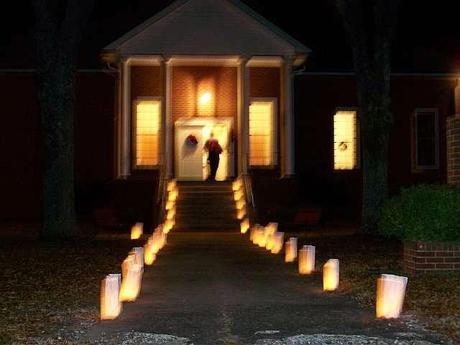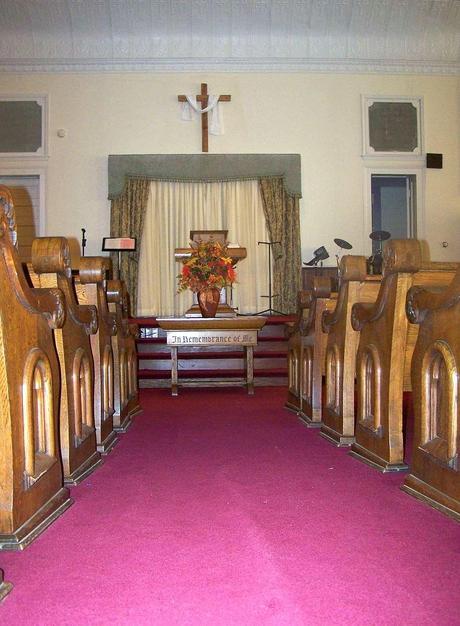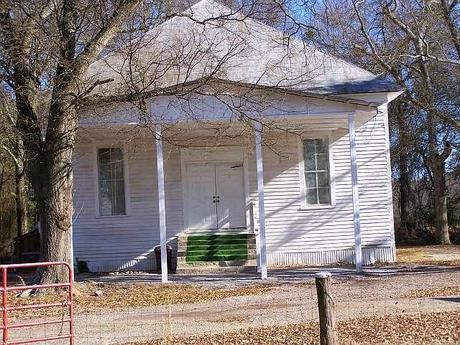
A Georgia church. EPrata photo
It's fashionable today to hate the church. People like to come across as wise sages, decrying the ecclesiology of the western church. Many people note that church is shallow, entertainment-driven, and lukewarm, with worthless shepherds leading clueless goats. Some even go so far as to say that most churches should be closed. They say they love Jesus but hate religion. They say that they love Christ but disparage the church.Reasons are given for today's fallen churches.
-Many believers are growing tired of the celebrity culture in our churches.You hear more and more that the First Century church is what we should get back to.
-Many believers are fed up with the incessant entertainment and worldly amusements found in the churches.
-Many believers are not being fed from the Word of God.
-Many believers are put off by the attempt to cater solely to youth, while ignoring their needs.
-Many believers are tired of just being bench warmers, with no role to play.
-Many believers are weary of the constant need to be “relevant” at the expense of biblical orthodoxy.
-Many believers are looking for the real deal. They want an encounter with almighty God, not just a razzmatazz stage production.
-Many believers are desiring genuine Holy Ghost revival, not just pep talks, self-help seminars, and a me-centered gospel.
-Many believers are starving for the reality of First Century Christianity

A Georgia church interior. EPrata photo
Now before I launch into a defense of the present-day church, I want to say that I agree with the sadness with which many people survey the ecclesiastical landscape in western and eastern Christianity and bemoan its pitiable state. I don't wear rose-colored glasses. I'm just as aware as the next woman of the Mark Driscolls, Joyce Meyers, zip-lining pastors, Steven Furticks, mega-church, Perry Nobles, flat screen hollowness, smoke saturated praise bands. I know.I've seen a collapse of church attendance, church doctrine, and individual fervor for Jesus just in the ten years I've been a church-goer. In my short tenure I've personally been impacted by a worthless shepherd spiritually abusing his flock, and a serial plagiarist lying to his flock- and neither of them cared. I've seen people fall away, become apathetic, or simply go through the ministry motions. I've seen false doctrine creep into hearts and women be drawn away by false teachers while their husbands look the other way. It's all sad. I've cried many a tear.
Yes it's getting hard to find a church near you that is reasonably doctrinal, and lives what they believe. But for every one mega-church shenanigans, there are 100 small, rural churches clicking along, preaching, loving, believing, having stale cookies in the basement on Wednesday nights. Like mine. None of the things that understandably make us sad makes me want to say any such thing like, "Church today stinks, I want the early church." Here are my reasons.
The number one reason to stop lusting after the first century church is that Jesus put us here, now. None of this is a surprise to Him. He put us here in this time and in this nation.
And he made from one man every nation of mankind to live on all the face of the earth, having determined allotted periods and the boundaries of their dwelling place, (Acts 17:26)
In His sovereignty and His plan, He didn't birth us in Jerusalem to see a risen Jesus and become a part of the early church. So get over it.
That first church was an ordinary church.
~John MacArthur
Second, since He did put us here now, what are we to do? Believe. Persevere. Be His lights in a dying culture that hates us. Stop worrying about the way things are in church - and I agree it's bad - but keep on keeping on.
I understand people have had to leave churches because of spiritual abuse, molesting pastors, or doctrinal disasters. I know and I agree in those and other tragic cases there is a warranted reason to leave and seek another place to worship. I also know that many people say that there simply aren't churches in their area that they'd put their trust in or allow their kids to attend. In those cases people have made do with forming their own bible studies in their living rooms and have taken advantage of technology to stay fed, until other options become available.
Let's take a good look at the first century church. Did they have to suffer through any of these issues? Oh yes, they did, and more.
In looking at Mr Muehlenberg's list of reasons to hate the 21st century church, there is nothing on that list the first century Christian's didn't grapple with.
Celebrities? They had 'em.
For when one says, "I am of Paul," and another, "I am of Apollos," are you not mere men? What then is Apollos? And what is Paul? Servants through whom you believed, (1 Corinthians 3:4-5)

A Georgia church steeple. EPrata photo
Not that Paul or Apollos thought themselves as celebrities, but the seeds were there to exalt men beyond their station and/or to follow them unto fractioning. There were first century unblieving church celebrities, Diotrephes was named by in 3 John 1:9 as someone who likes to put himself first-I have written something to the church, but Diotrephes, who likes to put himself first, does not acknowledge our authority. So if I come, I will bring up what he is doing, talking wicked nonsense against us. And not content with that, he refuses to welcome the brothers, and also stops those who want to and puts them out of the church.
Sounds like Diotrephes could have written Mark Driscoll's Mars Hill excommunication letters.
As far as being "fed up with the incessant entertainment and worldly amusements found in the churches" I dare say there were a few believers in the Corinthian church fed up with Lord's table orgies.
There were some believers - whole families even - not being fed the truth, as well. (2 Timothy 2:18, Titus 1:11).
"There were also believers who felt they were bench warmers, with no role to play"...(and whose fault is that?) In the first century church, they found a role to play, and were chastised for it. (1 Corinthians 14:26-33). There have always been bench-warning, resentful believers lusting after another's gifts or a bigger 'role to play.'
If you want a first century church, then do what they did, continually devote yourself...even when the football game is on.
What was that first church like? ... They were involved in what we would consider to be ordinary actions, ordinary realities. Verse 42, “They were continually devoting themselves to the apostles’ teaching and to fellowship, to the breaking of bread and to prayer.” Dear friends, those are the means of grace. Those are the ordinary things that every church should be engaged in. This is the life of the church. There’s nothing in there about entertainment. Nothing in there is spectacular. There’s nothing in there revivalistic. There’s nothing in there that catapults someone to some other spiritual level. ~John MacArthur, The Ordinary Church
Mr Muehlenberg wrote, "Many believers are starving for the reality of First Century Christianity". This is a sentiment echoed not just by him but many others. So let's look at that reality.

A Maine church. EPrata photo
Immediately, Peter and John were put in jail. (Acts 4:3)Immediately, the first century church sacrificed their belongings. (Acts 4:32). Do you know why?
Because Jerusalem had swelled with Jews from distant lands for Passover and then the crucifixion happened. Then Pentecost. Many thousands of the people who formed the first church were from those distant places. Acts 2:9-11 lists them,
Parthians and Medes and Elamites and residents of Mesopotamia, Judea and Cappadocia, Pontus and Asia, Phrygia and Pamphylia, Egypt and the parts of Libya belonging to Cyrene, and visitors from Rome, both Jews and proselytes, Cretans and Arabians.
They were converted, and they stayed. Thousands upon thousands of men and families stayed in Rome after they became believers. Because, really, what was there to go back to? Peter was preaching in Rome. The apostles were there, teaching. So the first century church had to support them. If you want the reality of the first century, then come together as a local church, each person in your church open your home to believing immigrants, and sell all you have to support them.
The days of purity were short. Along came Ananias and Sapphira and polluted the church by bringing sin into it. The incident is recorded in Acts 5. Days? Weeks? Most timelines I looked at place the killing of Ananias and Sapphira within the same year as Pentecost. So within 365 days at most, probably within mere weeks, corrupting sin was exposed in the church.
Let's set the scene. You're a young man excitedly arriving to worship. You see Ananias arrive too, you know him. Ananias lays a money bag at Peter's feet. Awww. Then Peter points at Ananias, calls him a liar, and he is smote on the spot! You're shocked. Terrified! (Acts 5:5b). You bundle Ananias up and bury him. Not exactly how you had planned to spend your worship day.
You return to continue worship a few hours later, and then the same things happens! Ananias' wife Sapphira arrives. You know her, seen her around. They own that big wheat field just outside of town. Peter points to her and SHE falls down dead too! You're called on to bundle her up and bury her as well. (Acts 5:7-10). Everyone is terrified. (Acts 5:11)
That is the reality of a first century church. A God who personally kills hypocrites in front of your eyes.
And it wasn't just that one time. Many partakers in the Lord's Table defiling became weak or died because of that, as a judgment (1 Corinthians 11:29-30). Jesus personally threatened to kill the false prophetess 'Jezebel's spiritual daughters if they didn't repent. That was the reality. Smiting from the finger of Jesus.
Could you say, "I want to go to another church, I don't think Peter should have pointed out Ananias' sin in front of everyone, that just wasn't loving." No. There wasn't a church down the road. For a long time, there were only seven churches in Israel and Asia.

A closed church. EPrata photo
Let's look at more of the reality of that first century church. You've arrived at your church in Sardis, expecting in a self-satisfied way that your week of ministry work will be accepted, and you'll get a heaping dose of theology to go along with that self-satisfaction. As the pastor walks to the front of the room and sits down, he says, "Today I don't have a sermon. Instead I will read a letter from John, dictated to him by JESUS."A shock goes through the congregation. And he begins this way:
‘I know your works. You have the reputation of being alive, but you are dead. 2 Wake up, and strengthen what remains and is about to die, for I have not found your works complete in the sight of my God." (Revelation 3:1-3)
Dead? Our church is DEAD?! You thought it was alive but the One who knows says it's dead. Quite a reality check that day for the church at Sardis.
You're in the church at Laodicea. Same scenario. Preacher goes to the front, and says instead of a sermon we will read a letter from John. He begins by telling you Jesus is so upset with you that he wants to vomit you out of His mouth. In all your comfortable riches, you never expected that. You're shocked. And upset. You want to leave this stinkin' church, and go to another, better one. Except...there isn't one.

A Canadian church. EPrata photo
Still in the first century, because John didn't die until sometime between 96 and 100 AD, you're at Thyatira. You settle in for a nice sermon and some fellowship after. Mmm, the roast smells good over there in the fire pit. The elder goes to the front, and tells you that instead of a sermon that day, he will read a letter from John dictated by Jesus. He then proceeds to tell you that the Lord of the Church HAS THIS AGAINST YOU. He is against you. They had been tolerating sin and Jesus was angry about it, and threatened to kill some women dead! If I was sitting there and reading a letter recently dictated by Jesus to John and heard my Lord had something against me, I'd just die of shame. Not the pleasant Sunday they were expecting. Anger, wrath, and threats of smiting. That was the reality of the first century church.I've seen this quote by the eminent theologian A.W. Tozer used in support of the lust to go back to the first century church.
“If the Holy Spirit was withdrawn from the church today, 95 percent of what we do would go on and no one would know the difference. If the Holy Spirit had been withdrawn from the New Testament church, 95 percent of what they did would stop, and everybody would know the difference.”Except we have seen that is not true. The church at Sardis was dead, and no one knew it. Ministries (works) were ongoing but none were advancing the kingdom. They had reputation only, no Spirit. The church at Laodicea had excluded Jesus, and no one knew it. He was outside knocking on the door to be let in. (Revelation 3:20)
The first century church is the same as our church, because it is made up of people who sin. Ananias' sin exposed wasn't the first sin in the church, because we're all sinners. It was just the first one that was exposed. Every local body since Pentecost has had all things in common, and that commonality is the faith in our risen Lord by His atoning work on the cross and subsequent resurrection. We have the Spirit in common. The Spirit wasn't stronger then, it's us who are weaker now.
Some of us. Some are still strong. It's life in the church, ordinary, regular, worshiping and learning church. I like my church. I stand amazed at the work the Spirit is doing in our local body. No we don't have resurrections from the dead or walls shaking with power. But we have the Spirit growing us, families staying together, pastor who prays on his knees, dedicated deacons and teachers. We have the faithful core who shows up every Sunday, and who give sacrificially when someone is in need. Just like the first century church.
In addition, we have a beautiful building in which to worship. We have freedom from persecution that took so many brothers and sisters in terror and in blood. We have the bible! The first century church did not have the advantage of the complete written New Testament! That didn't begin happening until around 170AD and wasn't affirmed until AD 363. Even then...printed materials were rarely in the hands of the people that didn't happen until the printing press made mass production possible after 1436.
In this very good article by Mark Jones, "Loving Christ But Hating His Bride?" Mr Jones said,
We must keep firmly in mind just how much Christ loves his church. That fact alone should transform the way in which we think about the church of Christ, which he purchased with his own blood.The church grass isn't greener on the other side of the centuries. If Jesus had put me in Rome in 30AD, I'd love the church. Since He put me in Georgia in 2015, I love the church. We do the same things the first century worshipers did: we study, we break bread, we share, we pray. We also sin, we fuss, we stray and get corrected, we worship in truth, we share...we're the church. And because it's the way Jesus designed it, I wouldn't have it any other way.
~~~~~~~~~~~~~~~~~~~
Further Reading
The Ordinary Church
Church: The Real Deal
